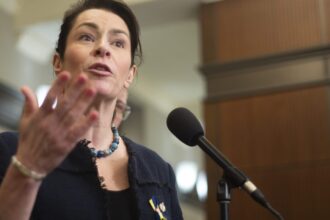Alberta’s New Democratic Party stands at a crossroads as members prepare to vote on severing automatic membership ties with the federal NDP—a decision that could fundamentally reshape progressive politics in the province.
The historic vote, scheduled for this weekend at the provincial party’s annual convention in Calgary, comes amid growing recognition that Alberta’s unique political landscape requires a distinct approach that may not always align with federal NDP policies. This potential separation would allow Alberta New Democrats to focus exclusively on provincial interests without federal party constraints.
“This isn’t about rejecting progressive values—it’s about acknowledging Alberta’s specific concerns require Alberta-specific solutions,” said Sarah Thompson, a long-time NDP strategist in Edmonton. “The provincial party is increasingly recognizing that winning in Alberta means developing policies that resonate with Albertans first, rather than adhering to a national platform.”
The proposed change would end the current system where members of the provincial party automatically become members of the federal party. If passed, Albertans could choose to join one party without being obligated to support the other—similar to arrangements already in place in other provinces including British Columbia, Quebec, and Saskatchewan.
This potential split reflects deeper tensions between regional and national interests, particularly around energy policy. Alberta New Democrats have frequently found themselves caught between supporting provincial economic priorities tied to resource development and the federal NDP’s climate positions.
Political scientist Dr. Martin Reynolds notes this could signal a significant shift in strategy: “The Alberta NDP is attempting to redefine itself as a party that can advocate for Alberta’s interests first, which may occasionally put it at odds with federal NDP positions. This is especially true regarding energy infrastructure and development.”
The move comes as the provincial NDP looks to rebuild following their 2023 election defeat to the United Conservative Party. Former Premier Rachel Notley, who often found herself at odds with federal NDP policies during her tenure, stepped down as leader in January, triggering a leadership race scheduled to conclude in June.
Financial implications also factor into the decision. Currently, a portion of provincial membership fees goes to the federal party—funds that could instead support provincial operations if the separation is approved.
Internal polling suggests most members support the change, though a vocal minority argues it risks undermining progressive solidarity at a time when unified opposition to conservative policies is crucial both provincially and federally.
The decision carries implications beyond Alberta’s borders. Should the measure pass, it could inspire similar moves in other provinces where regional priorities sometimes clash with federal party positions.
As Alberta’s political landscape continues evolving, this weekend’s vote raises a fundamental question about progressive politics in Canada: Can provincial parties better serve their constituents by maintaining independence from their federal counterparts, or does such separation ultimately fragment the progressive movement when unity is most needed?














